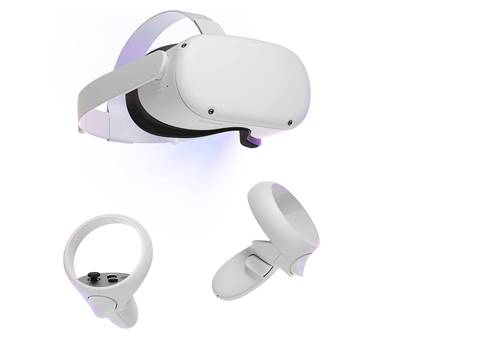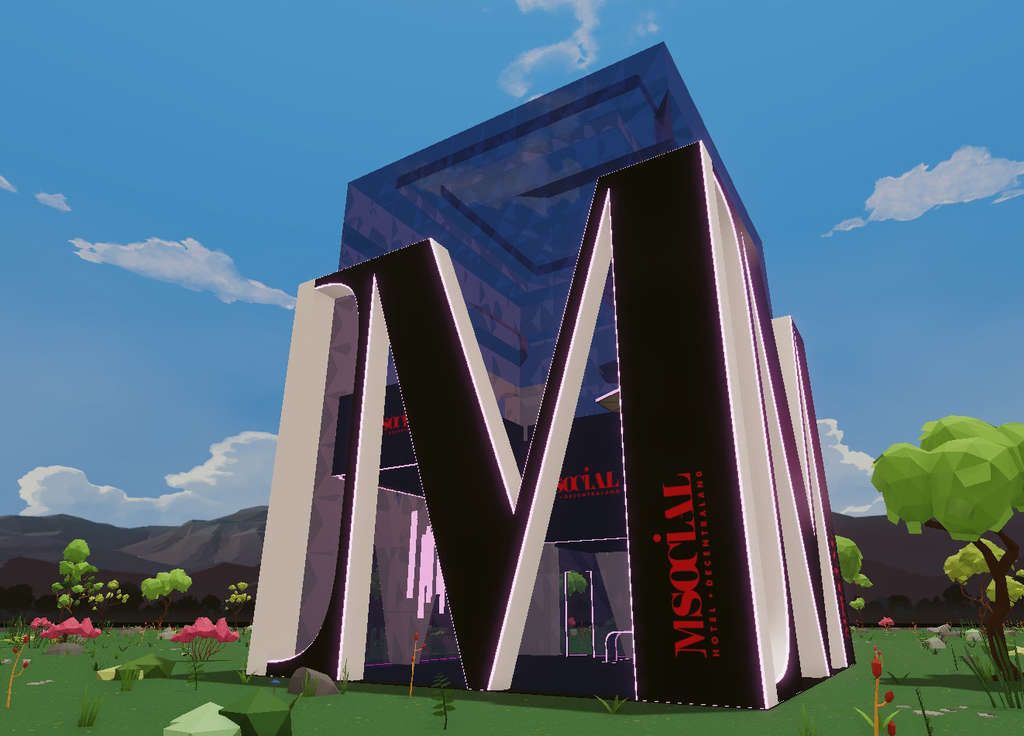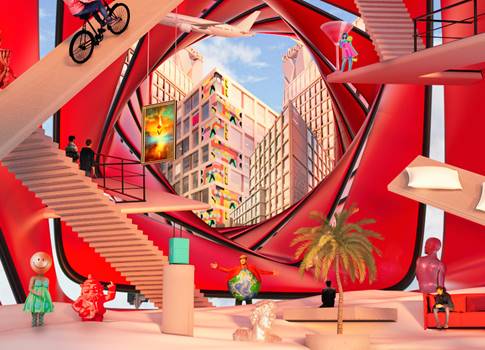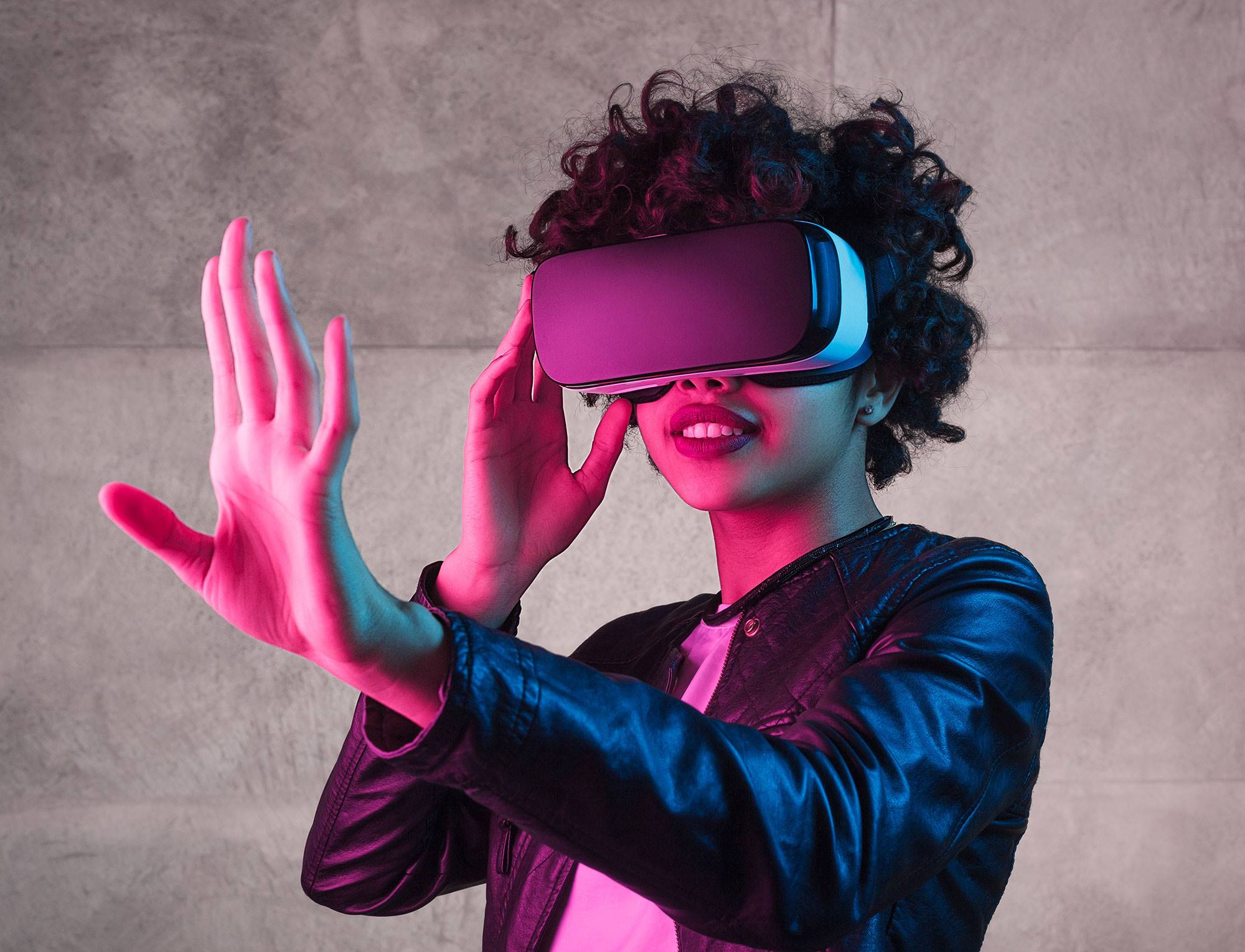Welcome to a new world
Some of us are still battling to get to grips with this world, let alone another. But, like it or not, the metaverse is real (ish) and should be very much on your virtual radar.
But does it really matter? Is it just another passing fad? Is it actually going to drive bookings? Is it going to take bookings away? Will it reinvent travel? Will it be the death of travel as we know it? Will Mark Zuckerberg's avatar haunt your dreams?
There are a lot of questions, some of which we aim to answer in this; our hotelier's guide to the metaverse.
What is the metaverse?
We could cheat and use a dictionary definition to kick things off, but even the dictionaries are struggling to define such a new and rapidly changing subject.
As the Google Trends search data below highlights, the metaverse (blue line) maintained a moderate interest level throughout the latter part of 2021, before a chap called Mark decided to rebrand his company 'Meta Platforms Inc' and spoke of the metaverse being the "...successor to the mobile internet" that will reach 1 Billion people within the next decade. All of a sudden, interest in the 'metaverse' rocketed; if Zuckerberg is touting this as the future and rebranding his entire company, there must be something in this, right?
Since then interest has wained a little, but the metaverse has certainly established itself as a regular headline grabber, even if the majority of us have been left wondering, just what exactly is it?
In short, the metaverse is...
A virtual world where we can meet, work, relax, play, learn, shop and who know's what else?
A Multitude of Metaverses
Great, so where can you check out this metaverse? Well, in retrospect, we should really have titled this 'a hoteliers guide to the metaverses', plural. There's not a single universal metaverse, as much as Facebo... sorry Meta Platforms, would like us to believe. In fact there's a number of metaverses already out there and it's highly likely that more will emerge over time.
Some of the most established and best-known metaverses are;
- Second Life - often described as the 'first metaverse', it launched way back in 2003 and allowed users to live a second life in a virtual world.
- Decentraland - first launched in 2017, Decentraland allows users to purchase virtual plots of land as NFTs (Non-Fungible Tokens) using MANA cryptocurrency. Some big brands have dipped their virtual toes in, including luxury brands like Dolce & Gabbana and Sotheby's. It recently hosted an 'epic' rave.
- Horizon Worlds is Mark's baby - first launched in August 2020 in beta form. It's since expanded and now includes other platforms like Horizon Venues - a home for concertgoers and Horizon Workrooms - for collaboration.
- Social Gaming metaverses - multiple virtual worlds exist that could be considered metaverses in their own right. For example The Sandbox, Roblox, Fortnite etc.
The common theme, other than they all sound like rather average theme parks, is that they all offer a similar experience, true to the definition of a metaverse we've already discussed.
But with multiple metaverses, how do you decide where to plant your virtual flag? There needs to be a degree of interoperability between these disparate metaverses to help encourage adoption. In plain English, our virtual representations (avatars) should really be able to travel relatively freely through different metaverses, much like we can travel to different countries in the real world. The recent launch of the Metaverse Standards Forum should hopefully begin to lay the foundations for this to happen. Founding members of the forum include some of the biggest tech players, which goes to show how seriously everyone is taking the metaverse.
Although really, when you stop and think about it, managing your presence in multiple metaverses is akin to having multiple social media profiles - you select those that are most relevant to your audiences and maintain your profiles accordingly.

How does one 'enter' the metaverse?
Care to dabble in some virtual adventuring? Jumping into a metaverse is usually done via a computer, smartphone or with a VR (Virtual Reality) headset. Then there's AR (Augmented Reality) which is almost like a hybrid - enhancing the real world with some virtual embellishments.
VR is one of the more commonly associated methods of metaversing (we're pretty sure we've made that word up) and sales of VR headsets have been growing rapidly, with around 20 million devices in use today and 34 million devices expected to be in use by 2024.
Meta's own Quest 2 and Sony's VR offerings have helped these figures grow significantly during the pandemic as the price point (from around £300) has made the technology far more affordable to the average consumer.
The technology is only likely to improve too. Devices will become smaller, screen resolutions higher, motion sickness less icky. Right now you'd probably get some funny looks if you popped on a VR headset during a flight, but will that be true in the future?
What value might this have for my business?
Now for the important bit. While the world's may be virtual, the business benefits must be very real to warrant investment. Imagining how your hotel brand could make use of the metaverse can be a challenge in itself, so to help illustrate some examples and tangible benefits, we present 7 use-cases below.
The Try-Before-You-Buy
Imagine if someone could sample the guest experience before arriving at your hotel - take a virtual tour of a room, see the view, experience the upgrade, sample the ambience. "But it's not like actually staying at the hotel..." we hear you cry (and you're right). But just as video and virtual tours were a natural evolution of photography, the metaverse would seem to be the next logical step to help enhance a guest's online experience while making a very strong digital first impression.
The Bride & Groom
What about the prospective bride and groom? Trawling round 15 venues. Days, weeks, months of their lives, not to mention the countless arguments, searching for that perfect spot. If they could pop on a VR headset and get a representative experience of your venue spaces, with a virtual guide, would that not be more convenient? Never mind the control you have over that experience; the sun always shines, the tables are always immaculately decorated and the venue is open, 24/7. Imagine if they could even see a representation of themselves, at the altar? Could you even offer 360 photography of the wedding itself, with the ability to return to exactly the same spot within the metaverse to experience it all again, on their anniversary? Awww.
The Recruitment & Training Challenge
Imagine being able to showcase what it's like to work in your properties virtually - albeit through a carefully curated experience with no awkward guests! Or maybe you'd like the awkward guests, there to act as training exercise so that your team can make their mistakes virtually, rather than in front of real live human beings. Being able to recruit and train your team, irrespective of their location, could potentially save you money, all while improving the consistency of your service offering.
The Corporates
What about corporates and business travel, when it returns in earnest? Could buyers tour your property virtually to see if it meets their expectations, from the comfort of their own home or office? Marriott Madrid certainly think so (more on that later). The lack of geographical restriction could be a real boon to independent hoteliers. International corporate travel bookers may well opt for the 'safe' big branded hotel group, rather than what may be perceived to be a risky independent option. Perhaps the ability to experience the hotel virtually could go some way in alleviating their concerns.
The Virtual Conference Attendee
Right now they have to make do with a pretty single-layer experience - watching recordings, attempts at virtual networking (often no more advanced than an online chat) and an ambiance-lacking representation overall. Could a virtual conference help place these individuals into a more inclusive and immersive experience? While it may not be your place to develop a solution to this, integrating with the right technology platforms will certainly be important.
The Augmented Reality Burger
Could you expand upon your real world guest experience with some virtual additions through the use of Augmented Reality? Could a guest scan your in-room dining menu to see an augmented reality burger pop up right in front of them - previewing their dinner before deciding? Upselling those visually appealing sides would be a breeze and we're pretty sure that an augmented reality desert has less calories too. AR offers a number of opportunities to add an additional layer to your guest's on-property experience to help create a more memorable stay.
Virtual Products, Services & Experiences
Finally there's the opportunity of virtual products, virtual services and virtual experiences. Could you create a completely virtual hotel, replete with virtual rooms and suites?
- Could guests (avatars) stay the night in return for a little cryptocurrency, or simply to try-before-they-buy in the real world?
- How about a virtual cook-a-long with your head chef? We bet he/she would love that, especially on a busy Friday night.
- Could you partner with others to offer virtual experiences? A virtual concert in the grounds of your virtual hotel, with virtual fireworks to add a little more pizazz?
- Could you expand or extend your product offering? For example, if you don't have the space for fitness facilities - have your guests pop on a VR headset and voila - they're transported to a branded fitness suite right in the comfort of their own rooms. Just be prepared for additional maintenance charges as overly enthusiastic guests will inevitably punch holes in your pristinely painted walls.
- Could you sell ownership of a suite in your hotel as a NFT?
- Could you even use NFTs as a replacement (or accompaniment) to your loyalty programme? E.g. Gold NFT members get exclusive virtual and real-world benefits.
Some of these may well seem like pipe dreams right now and there will likely need to be further societal and attitudinal shift before these types of thing become more mainstream, but the direction of travel is moving this way.
Also, you may see the virtual world as more of an opportunity to gain brand exposure, in addition to driving revenue - to get your brand in front of new eyeballs and perhaps a younger demographic. It's also worth remembering that this is another opportunity to gather valuable first-party data on those who are showing interest in your brand.
Ultimately, the virtual world could present your brand with opportunities to truly stand out from the crowd, offering your guests experiences that would have previously been unimaginable.
Who's already there?
A number of brands claim to have been the 'first' to open a hotel in the metaverse. Here are the stories of 4 early-adopters.
Millennium Hotels & Resorts opened M Social Decentraland (pictured below) in Genesis Plaza on May 5th 2022. Avatars can use cryptocurrency to 'stay' at the hotel, engaging with an avatar receptionist on arrival, before mingling with other guests and attending events. Future plans include the ability for guests to rent or buy space inside the hotel for product launches and other events. They also intend to link the real-life website of the M Social brand with the virtual representation in Decentraland.
Sarabh Prakash, Group Senior VP of Commercial noted that "The metaverse presents a myriad of opportunities for us to create unique social connections with our guests".


CitizenM announced the acquisition of 'LAND' in The Sandbox (the first hotel group to invest on the platform) in April 2022, with the aim of beginning work on a virtual hotel. Art features prominently within CitizenM properties and that looks set to be replicated in the virtual world with the sale of an exclusive collection of hotel NFTs with real-world benefits attached.
CitizenM have grand plans too. They intend to work with more digital artists to create and sell NFTs, with the profits as well as the incorporation of a Decentralized Autonomous Organization (DAO) to fully finance the real-world development of a property, where NFT owners will help to decide the location. Bold.
Madrid Marriott Auditorium Hotel & Conference Center, the largest self-contained hotel and meeting facility in Europe, is building a 'digital twin' to help represent the property in three-dimensions, within the metaverse. Of course this means that conference and event planners don't need to jump on a flight to preview the venue - saving time, money and the planet. You can see how the virtual vs. real-world properties look below.
Finally we have Accor who have been testing out the metaverse for conducting virtual internal meetings, with their CTO, Floor Beeker, even being interviewed within the metaverse, by HospitalityNet, earlier this year. Speaking in May 2022, Beeker noted that "there is a lot of work still to be done" but that "it's a much cooler experience than the traditional video conference that we're all so used to now". He added that he believes the metaverse will be used initially for the "stay before the stay" to allow guests to preview a room in advance of booking. You can see the full (albeit brief) interview below.
So, what next?
"In the future you'll be able to..." is a common phrase you'll hear when people discuss the metaverse. In fact, the metaverse is a "proposed version of the internet that incorporates three-dimensional virtual environments" according to the Collins dictionary - we nearly made it through this piece without a dictionary definition! Proposed is an interesting choice of words. It would imply that this is a future consideration, not for right now.
Ultimately, that's probably where the bulk of the opportunity is; the future. Technology must evolve a little. People must become more acclimatised to it. A little generational change needs to happen, as the tech-savvy begin to age and are more willing to live a more virtual life.
But the future could mean tomorrow, 2 years, 5 years or 20 years from now. Even with our best 'futurist' hat on, it's challenging to predict how quickly the metaverse will be adopted, but with attempts at standardisation and it's worth being projected to be as high as $800 Billion by 2025, it's most likely to be years, not decades.
Do you need to rush out and build a virtual hotel in the metaverse tomorrow? Probably not. But to dismiss the metaverse as a passing fad would be foolhardy. Be aware of the early adopters and dip your virtual toe in if you have the opportunity.
Should you be planning ahead to ensure you're primed to take advantage in the next couple of years? Most definitely, yes. The OTAs will be exploring all avenues and we don't want to be late to the party, again.
A Master-Meta Plan
So if metaverse maturity is likely to be years away, not decades away, it's certainly deserving of your attention. But what can you do today? Our advice would be to get your team around a table (in reality or virtually) and begin to build a plan. Plan for multiple scenarios; metaverse world-domination, metaverse meh and something more in the middle.
To help get you started, here's 6 questions to ask yourselves. If you can confidently answer all 6, you'll likely be further ahead than many of your competitors.
- Why should we enter the metaverse?
- What business objectives do we hope to achieve by operating in the metaverse?
- What value can we bring our guests in the metaverse?
- Are our guests in the metaverse already?
- Is this about driving revenue, awareness or both?
- How can we maintain a brand consistency and uphold our brand values in the metaverse?
What do you think?
Over the coming months we hope to form an industry working group to actively discuss the metaverse and its place within hospitality. We invite hoteliers keen to share their thoughts to reach out either on social media or to marketing@eighty-days.com.
Monitoring the Metaverse
Finally, rest assured that we'll be keeping a very close eye on the growth of metaverse technology and will advise our clients on when and where to take action. Sign up to our newsletter below to stay in the loop.






